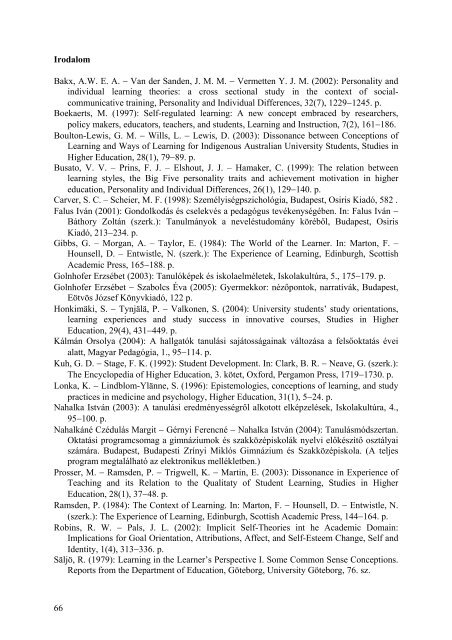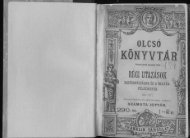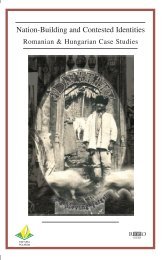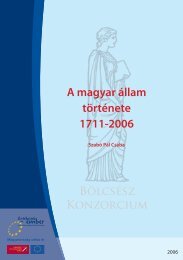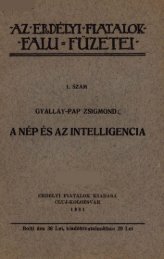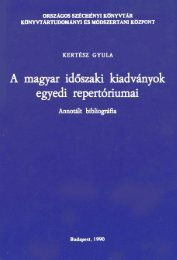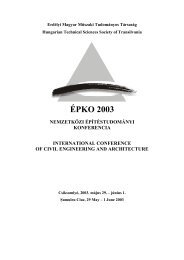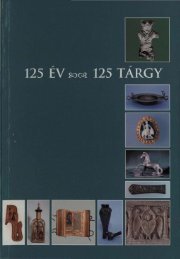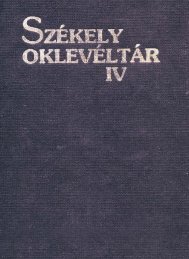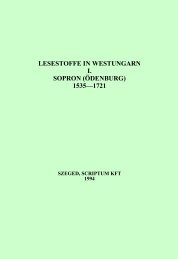Hatékony tanulás - MEK
Hatékony tanulás - MEK
Hatékony tanulás - MEK
Create successful ePaper yourself
Turn your PDF publications into a flip-book with our unique Google optimized e-Paper software.
IrodalomBakx, A.W. E. A. − Van der Sanden, J. M. M. − Vermetten Y. J. M. (2002): Personality andindividual learning theories: a cross sectional study in the context of socialcommunicativetraining, Personality and Individual Differences, 32(7), 1229−1245. p.Boekaerts, M. (1997): Self-regulated learning: A new concept embraced by researchers,policy makers, educators, teachers, and students, Learning and Instruction, 7(2), 161−186.Boulton-Lewis, G. M. − Wills, L. − Lewis, D. (2003): Dissonance between Conceptions ofLearning and Ways of Learning for Indigenous Australian University Students, Studies inHigher Education, 28(1), 79−89. p.Busato, V. V. – Prins, F. J. – Elshout, J. J. – Hamaker, C. (1999): The relation betweenlearning styles, the Big Five personality traits and achievement motivation in highereducation, Personality and Individual Differences, 26(1), 129−140. p.Carver, S. C. – Scheier, M. F. (1998): Személyiségpszichológia, Budapest, Osiris Kiadó, 582 .Falus Iván (2001): Gondolkodás és cselekvés a pedagógus tevékenységében. In: Falus Iván −Báthory Zoltán (szerk.): Tanulmányok a neveléstudomány köréből, Budapest, OsirisKiadó, 213−234. p.Gibbs, G. – Morgan, A. – Taylor, E. (1984): The World of the Learner. In: Marton, F. –Hounsell, D. – Entwistle, N. (szerk.): The Experience of Learning, Edinburgh, ScottishAcademic Press, 165−188. p.Golnhofer Erzsébet (2003): Tanulóképek és iskolaelméletek, Iskolakultúra, 5., 175−179. p.Golnhofer Erzsébet − Szabolcs Éva (2005): Gyermekkor: nézőpontok, narratívák, Budapest,Eötvös József Könyvkiadó, 122 p.Honkimäki, S. − Tynjälä, P. − Valkonen, S. (2004): University students’ study orientations,learning experiences and study success in innovative courses, Studies in HigherEducation, 29(4), 431−449. p.Kálmán Orsolya (2004): A hallgatók tanulási sajátosságainak változása a felsőoktatás éveialatt, Magyar Pedagógia, 1., 95−114. p.Kuh, G. D. − Stage, F. K. (1992): Student Development. In: Clark, B. R. − Neave, G. (szerk.):The Encyclopedia of Higher Education, 3. kötet, Oxford, Pergamon Press, 1719−1730. p.Lonka, K. − Lindblom-Ylänne, S. (1996): Epistemologies, conceptions of learning, and studypractices in medicine and psychology, Higher Education, 31(1), 5−24. p.Nahalka István (2003): A tanulási eredményességről alkotott elképzelések, Iskolakultúra, 4.,95−100. p.Nahalkáné Czédulás Margit − Gérnyi Ferencné − Nahalka István (2004): Tanulásmódszertan.Oktatási programcsomag a gimnáziumok és szakközépiskolák nyelvi előkészítő osztályaiszámára. Budapest, Budapesti Zrínyi Miklós Gimnázium és Szakközépiskola. (A teljesprogram megtalálható az elektronikus mellékletben.)Prosser, M. − Ramsden, P. − Trigwell, K. − Martin, E. (2003): Dissonance in Experience ofTeaching and its Relation to the Qualitaty of Student Learning, Studies in HigherEducation, 28(1), 37−48. p.Ramsden, P. (1984): The Context of Learning. In: Marton, F. − Hounsell, D. − Entwistle, N.(szerk.): The Experience of Learning, Edinburgh, Scottish Academic Press, 144−164. p.Robins, R. W. − Pals, J. L. (2002): Implicit Self-Theories int he Academic Domain:Implications for Goal Orientation, Attributions, Affect, and Self-Esteem Change, Self andIdentity, 1(4), 313−336. p.Säljö, R. (1979): Learning in the Learner’s Perspective I. Some Common Sense Conceptions.Reports from the Department of Education, Göteborg, University Göteborg, 76. sz.66


